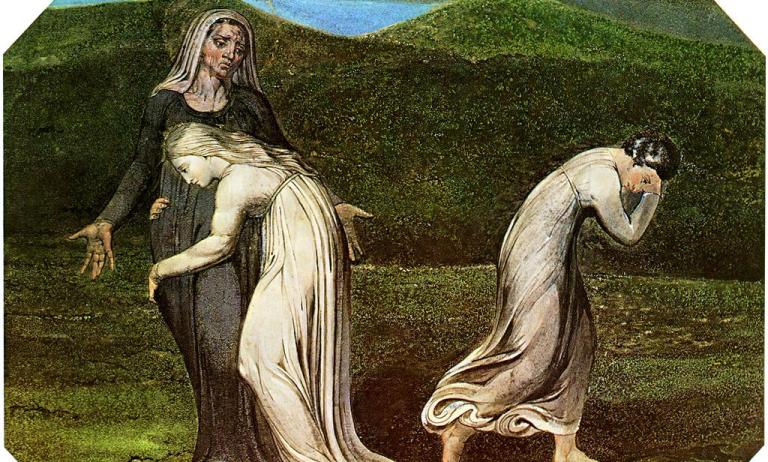Those Wounds Yet Visible Above
I’ve often taken comfort from the idea that Jesus’ resurrection body still bears the scars of crucifixion in his hands, feet, and side. A teacher I respect says that the only person in Heaven whose body remains imperfect will be Jesus, who carries the marks of mortality and the sacrifice he made for all humanity. I’ve also reflected on the idea that his wounds are an expression of his continual intercession for us – though we be perfected in the by and by, and never again sin, we will still be justified by Jesus’ righteousness rather than our own.
We won’t hand his righteousness back and stand on our own merit once we can manage it.
The righteousness of Christ, given to us through the cross in exchange for our own, is not a loan; it is the eternal justification on which we stand, and we will always be recipients of mercy because of the intercessory wounds of Christ.
As the hymn writer captured so beautifully in the wonderful ‘Crown Him With Many Crowns’:
‘Crown Him the Lord of Love:
Behold His hands and side;
Rich wounds yet visible above
In beauty glorified.’
Despite all the encouragement this has brought me over the years, a friend presented me with a complementary idea over dinner this week, and it’s added an extra dimension to the concept of eternal scars and what they might signify.
Repaired, not replaced
You’ve no doubt heard of the Japanese art of Kintsugi – the art of repairing broken pottery by mending the areas of breakage with lacquer dusted or mixed with powdered gold, silver, or platinum. The beauty of Kintsugi is not that precious metal is used to bind the breakages, but that the breakages are part of an object’s story. Conceptually, Kintsugi’s power is in choosing preservation over replacement.
In Kintsugi, the repair of an object becomes part of its value and beauty. Lovers of antiques enjoy the beauty of visible repairs in other forms of restoration too, including old patches of riveted metal, iron staples in broken china, and carpentry repairs that were not hidden away by the restorer, but left in plain sight as part of the honesty and story of a cherished item.
John Wimber, the founder of the Vineyard movement and a man who moved powerfully in gifts of healing, was regularly known to say ‘Never trust a leader without a limp’ – an interesting assertion from someone who believed God wants to see healing gifts multiply vastly among his people. It might seem counterintuitive, but I get it. He is not, of course, referring to a physical ailment, but the evidence of having been through a few battles. He is speaking of emotional scars.
What does emotional scarring tell us?
For starters, scars are more than a clue that a wound was taken; they are evidence that we have healed from that wound. A scarred person is no longer wounded – they
were wounded, but have undergone a process of healing. Scars tell a story of recovery, and recovery from serious emotional injury takes personal discipline, maturity, and a grasp of grace.
I’ll use my own story as an example. At the age of 21 I was full of the Spirit and utterly confident of what I believed the Lord was going to do in my life. Missionary work in Asia beckoned, and I was a couple of weeks away from getting on that plane to begin a life of effectiveness for the Lord. One Sunday night, I attended a church service in a rowdy and much-loved
Pentecostal church in Nottingham, where a well-known prophetess was ministering. At the end of the service I asked her to pray for me, and she delivered the following words:
“The next few years are going to be hard, but you’ll learn lessons that will keep you the rest of your life.”
It wasn’t what I wanted to hear but I accepted the word nonetheless, as it had the ring of truth.
Now I am a firm believer that God does not bring suffering into our lives to teach us lessons. He is not the author of pain, sickness, or any other form or torment, but
the Lord squeezes goodness out of even the hardest circumstances, including the ones we bring on ourselves, doing everything he can to teach us how to get free of our prisons, stay free, and help others do the same.
The prophetess was right. The next few years were incredibly hard, involving significant physical illness and psychological collapse, to the point where I thought my life was over, but in the Lord’s gentle company I recovered – slowly, but I made it out of the pit, and that pit is now ringed with the sturdiest fence to keep me from stumbling into it again.
This is the nature of healing, and the lessons that leave scars; we heal, and in healing, learn how to avoid repeating the mistakes that led to our wounding in the first place.
I won’t go into the details of what I suffered, or this article will turn into a novella, but I would like to list some of the lessons I had to learn before I was ready to be free:
- God’s love is far too deep, rich, and devoted to ever be hindered by my behaviour or performance. I am loved just as I am.
- Spiritual activities (the ministry I was delivering, along with personal prayer and devotion) are important, but so is having fun, enjoying friendship, and going on marvellous adventures.
- I am in control of little other than my own reactions.
- True faith is an expression of simple, childlike trust. It is not manly, adult, or self-proclaiming. It simply believes.
- God will defend me; there is no need to defend myself.
On top of this, I had to learn to forgive. The missionary society I was part of was partly responsible, I believe, for the worst catastrophe that happened to me, but I had to put that aside to move on.
In processing all these lessons I prepared myself for freedom, and when I was ready, I found the prison door was already open and walked right out. I was free; scarred, and walking with a limp, but free.
God is heavily invested in our healing and growth
I believe that Heaven cheers us on in our walk of faith. The Lord sees what we go through and is right here with us in it. He comforts us, teaches us, leads us, celebrates every tiny step towards freedom, and roars in triumph at our victories and breakthroughs.
Our God is victorious, and ultimately, so are we. We shall be in Zion.
There are only three places in the Bible where we see the will of God perfectly performed: In Eden before the Fall, in the life and ministry of Jesus, and in the New Jerusalem, also known as Zion (Heaven), where there will be no more tears or suffering. Revelation 21:4,
‘He will wipe every tear from their eyes. Death shall be no more; nor sorrow, nor wail of woe, nor pain; for the first things have passed away.’
It is not that we will simply stop crying;
He will wipe every tear from our eyes.
He will minister to each of us personally, healing us of every sorrow. What a God we serve!
I used to think that if human history is topped and tailed with perfection in paradise, with Jesus right in the middle of it all, that the difficulties we go through are unimportant, but now I see things differently. Every wound we have taken, from which we have learned and grown, leaves a glorious scar – evidence of God’s healing and leading, and our willingness to yield to him. Every scar we bear tells a story of conflict and resolution. Of faith under fire.
Sometimes we even bear scars for others. I know of a young couple who due to tragic circumstances might end up looking after a 14 year old boy at the time in life when they want maximum freedom, but they will take him on and love him, despite the cost. Life isn’t always fair, and sometimes we take damage when standing up or standing in for someone else. These wounds in particular – these sacrificial acts of service – are of the highest import to God.
God is by nature a rewarder, ready to praise those who choose love. He told his disciples that if anyone gave them even a cup of water they would not fail to receive their reward. If God is passionate about the giving of rewards, he surely celebrates every aspect of our growth, including the tiniest steps. The lessons that won us that growth, the scars we’ve taken as part of discipleship, and the scars we are left with because of the service of others, are glorious indeed.
I do not believe the journeys we embark on in life are unimportant. Indeed, they form the fundament of our eternal destiny. 2 Cor 4: 16-17,
Therefore we do not lose heart. Even though our outward man is perishing, yet the inward man is being renewed day by day. For our light affliction, which is but for a moment, is working for us a far more exceeding and eternal weight of glory.
Our discipleship is sacred, our growth and healing cherished by God and celebrated by the great cloud of witnesses, cheering us on from on high. These temporary sufferings are not just obstacles to overcome; as we embrace God’s healing, they are achieving for us an eternal weight of glory.
I have begun to suspect that in Heaven we will still bear these scars – not as evidence of wounding, but as evidence of healing. We shall be like beautiful Kintsugi vases, our past breakages on display, along with the loving work of the Restorer. This life is our story, and our stories will resonate for eternity.


